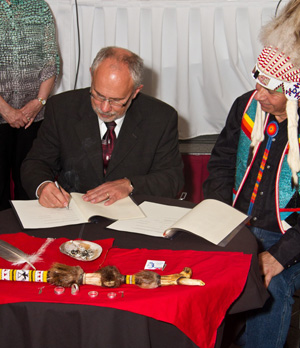
Providence University College and NAIITS sign agreement in principle to offer a Bachelor’s degree in Community Development Studies.
Bachelor’s Degree in Community Development
As the Christian Higher Education Canada consultation on Native Peoples and Christian Higher Education, co-sponsored with the North American Institute for Indigenous Theological Studies (NAIITS), came to a close, Providence University College and NAIITS signed an agreement in principle to offer a Bachelor’s degree in Community Development Studies. The program will be designed and delivered by Indigenous people and will provide learning by doing through incorporating a significant component of in-community internship. The degree will begin accepting students in the fall of 2013 with a program start January 2014.
“We have unrealized capabilities as a people. This training will build on our capacity by providing practical skills in the context of sound community development theory,” said Mi’kmaq scholar Terry LeBlanc, Executive Director of NAIITS. David Johnson, Interim President of Providence University College and Providence Theological Seminary, and Cameron McKenzie, Academic Dean at PUC, note that this partnership will create an opportunity for Providence to embrace the insight, skill, and experience of First Nations scholars and communities in a mutually creative relationship. Together we will generate a robust Indigenous educational enterprise, even as we enliven the educational vision of Providence to foster knowledge and character for leadership and service.
Practical Skills
Over the years, NAIITS’ faculty has observed that Indigenous people in North America are resilient; this is evident in our perseverance in the face of historic social disparities including inadequate preparation for post-secondary education. This training will build upon the skills that have made Native North American people survivors and leaders in the Indigenous world globally. While it is important to continue to shate the Good News, this development degree will, to use play on words, complete the “whole” in that gospel, by giving students marketable skills aimed at assisting their communities in sustainable growth and development. The focus will be on word accompanied by action – the action Jesus calls us to engage in as a visible manifestation of his Good News.
“Who better to teach about community development than Indigenous people?” asked Ray Aldred, Chairperson, of NAIITS. “We have been slowly rebuilding our communities. After more than a century and a half assimilation attempts, we have survived and now we are beginning to flourish.” “This marks a vital shift in the way that we approach Indigenous education,” said Catherine Rust-Akinbolaji, a faculty member at Providence, “not top-down programming for, but bottom-up partnering with.”
The Providence/NAIITS agreement marks the beginning of another degree partnership inspired by NAIITS’ commitment to deliver culture specific programs for Indigenous people.
Wendy Beauchemin Peterson, adjunct faculty at PUC and editor of the NAIITS Journal, expressed her delight at two streams of her academic life merging. “I have long believed that Providence has unique contributions to make towards Aboriginal post-secondary education – in an environment not merely welcoming to Aboriginal students, but seeking to reflect Aboriginal values and acknowledges Aboriginal contributions to the academy.”
Founded in 2000, NAIITS is already a worldwide leader in Indigenous faith-based education. Currently working in four countries, NAIITS’ partnerships with three other University and Seminary institutions to offer three advanced degrees: a Master of Arts in Intercultural Studies (MAIS) with George Fox University and Evangelical Seminary; a Masters in Theological Studies, Indigenous (MTS [I]) in partnership with Tyndale University College and Seminary; and a PhD in International Development (PhD ID) with Carey International University in Pasadena, CA.



